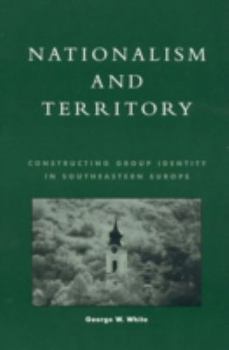Nationalism and Territory: Constructing Group Identity in Southeastern Europe
Select Format
Select Condition 
Book Overview
Why do nations come into conflict? What factors lead to the horrors of ethnic cleansing? This timely book offers clear-eyed answers to these questions by exploring how national identity is shaped by place, focusing especially on Serbia, Hungary, and Romania. Moving beyond studies of nationalism that consider only the economic and geostrategic value of territory, George White shows that the very core of national identity is intimately bound to specific...
Format:Hardcover
Language:English
ISBN:0847698084
ISBN13:9780847698080
Release Date:March 2000
Publisher:Rowman & Littlefield Publishers
Length:320 Pages
Weight:1.21 lbs.
Dimensions:0.9" x 6.2" x 9.0"
Customer Reviews
1 rating
Thought-provoking analysis
Published by Thriftbooks.com User , 24 years ago
Most working definitions of nationalism incorporate, in one way or another, the view that national identity is somehow connected to territory. But in most studies on the topic of nationalism, the whole issue of territory receives little more than this perfunctory mention. White's recent study tackles the issue of territory in national identity head on. As a geographer, he offers some unique perspectives on this often overlooked aspect of nationalism. This is quite important, since at their base, almost all nationalisms are somehow grounded on a specific physical place or places and the desire of a certain group of people to control this space in some manner. White quite plausibly argues that territoriality, i.e. the protective or possessive attitude people exhibit toward places, is probably the most vital component of nationalism, even though this is an aspect that is most oft-neglected by scholars, journalists, policy-makers, etc. when dealing with specific cases of nationalism. The author's specific emphasis is on southeastern Europe, with case studies covering Hungary, Romania and Serbia. This is a good choice, since all three of these countries and their nations provide a wealth of historical examples and all three are still "hot" areas in political terms. In addition, the fact that the territorial claims of these three nations often overlap provides an excellent illustration of White's central point on the importance of places in defining identity and the potential violence which can erupt when territorial claims clash. White brings to this argument a large number of geographical and sociological sources not usually used when discussing nationalism. However, the book does have its weaknesses. The principal shortcoming is that much of the text seems to have been hastily written in the three case studies, and much of its seems formulaic (indeed, in a few places entire paragraphs are repeated almost verbatim from chapter to chapter). Also, the overall argument put forward by the author would have been better served if he included a comparison and contrast of his case study nations and also discussed how their mutual conflicts over the same territory influenced their respective national development. Nonetheless, this book represents an important recent contribution to the literature on nationalism.






